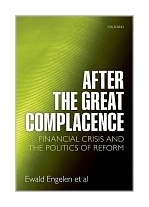|
||
• wydawnictwa polskie
• Zamów informacje o nowościach z wybranego tematu • kontakt
• Cookies na stronie |
AFTER THE GREAT COMPLACENCE: FINANCIAL CRISIS AND THE POLITICSENGELEN E. EDITOR / POLITICSwydawnictwo: OXFORD UP , rok wydania 2011, wydanie Icena netto:
What is the relationship between the financial system and politics? In a democratic
system, what kind of control should elected governments have over the financial markets?
What policies should be implemented to regulate them? What is the role played by different
elites - financial, technocratic, and political - in the operation and regulation of the
financial system? And what role should citizens, investors, and savers play? This book offers a controversial and accessible exploration of the disorders of our financial capitalism and its justifications. With an innovative emphasis on the economically 'undisclosed' and the political 'mystifying', it combines technical understanding of finance, cultural analysis, and al political account of interests and institutions. Readership: Academics and researchers across the social sciences, policy makers and advisors, and all those interested in understanding the current financial crisis Table of Contents Introduction Section I: Section 2: Beyond Democratic Control? Mystified Politics Before and After the Crisis Conclusion 304 pages, Hardcover Księgarnia nie działa. Nie odpowiadamy na pytania i nie realizujemy zamówien. Do odwolania !. |


